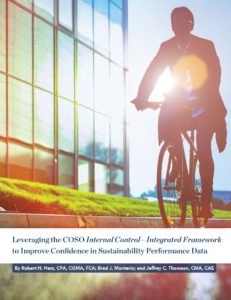
Former FASB Chairman Robert Herz, IMA (Institute of Management Accountants) President and CEO Jeff Thomson, and sustainability reporting expert Brad Monterio of Colcomgroup, today released a jointly authored thought paper, “Leveraging the COSO Internal Control – Integrated Framework (ICIF) to Improve Confidence in Sustainability Performance Data.” Given the rising demand for sustainability performance data to support internal and external decision making in creating, growing and reporting value, the paper asserts that confidence in this type of information is strengthened by the application of the COSO ICIF, a robust and globally recognized framework designed to apply to both financial and non-financial information.
“Confidence in the accuracy, timeliness and relevance of performance data is critical to effectively optimizing corporate activities and communicating reliably to the capital markets,” says co-author Robert Herz, who currently serves as a Sustainability Accounting Standards Board (SASB) Foundation board member. “In the financial reporting ecosystem, confidence is bolstered in part by the implementation and application of effective, integrated internal controls – controls established using the Framework developed by the Committee of Sponsoring Organizations of the Treadway Commission (COSO).”
Originally created in 1992 and refreshed in 2013, the COSO Internal Controls Integrated Framework aims to enable organizations to effectively and efficiently develop and maintain systems of internal control. The Framework enhances the likelihood of achieving the entity’s objectives and ability to adapt to changes in the business and operating environments. It emphasizes the importance of management judgment in designing, implementing, and conducting internal control, and in assessing the effectiveness of a system of internal control. The authors believe that “the COSO principles on effectiveness – controls that are present, functioning, and integrated – could apply to all types of performance data, including sustainability information, using professional judgment.”
While the paper demonstrates how the COSO ICIF principles would apply to sustainability data, the authors took a practical approach to the thought paper. This was accomplished by leveraging many third-party resources (such as SASB’s sustainability knowledge domains), conducting interviews and soliciting corporate case studies from organizations that are pioneering the use of effective internal controls around sustainability data. These examples demonstrated that investors and analysts are requesting, and many companies are beginning to integrate, better controls into their internal management processes.
Integration of sustainability data in governance, controls design, and performance management, rather than isolation, is key.
“This paper was simply meant to expand and accelerate conversations occurring globally on the use of sustainability performance data in value creation, growth and reporting, thereby strengthening organizational capability and informing the capital markets in a more holistic, forward-looking manner,” says co-author Jeff Thomson, CEO of IMA.
“In the process of writing this paper, we found that the body of knowledge and practice around development of effective internal controls for sustainability data is just beginning to emerge,” says Brad Monterio, co-author and a former global board member of IMA. “As demand for this information increases from investors, analysts, and the markets – and the need for confidence in that data rises – companies already advancing in this area may gain competitive advantage as well. This could include lower cost of capital, lower risk premiums, and enhanced reputation and brand value.”



